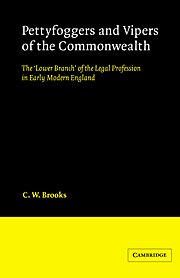 Pettyfoggers and Vipers of the Commonwealth
Pettyfoggers and Vipers of the Commonwealth Published online by Cambridge University Press: 28 October 2009
The participation of well-known common laywers such as Sir Edward Coke, John Selden, Francis Bacon, and William Noy in some of the more important political debates of the early seventeenth century is a familiar feature of early Stuart history. In the case of these eminent barristers, it is usually possible to find out something about their political attitudes and activities either by looking at the speeches they made in parliament or by reading their published works. By comparison, the public careers of members of the lower branch are much more obscure. Very few of them sat in parliament, and, although some practitioners wrote books, the instances in which the thought and action of individuals can be analysed in conjunction are extremely rare. Consequently, a study of the political role of the lower branch must take us away from national politics to the county and the town, and any conclusions about the characteristic impact of this group of lawyers must perforce be drawn somewhat obliquely.
Even in the provinces, most practitioners lacked the wealth and social cachet necessary to lay claim to important positions such as a place on the commissions of the peace or the office of sheriff. But there were a number of local administrative offices which could provide a means of entry into public life. By the early seventeenth century, country attorneys frequently filled a long list of posts such as that of undersheriff, coroner, feodary for the court of Wards, clerk of the peace, clerk of assize, and, perhaps most frequently, town clerk.
To save this book to your Kindle, first ensure [email protected] is added to your Approved Personal Document E-mail List under your Personal Document Settings on the Manage Your Content and Devices page of your Amazon account. Then enter the ‘name’ part of your Kindle email address below. Find out more about saving to your Kindle.
Note you can select to save to either the @free.kindle.com or @kindle.com variations. ‘@free.kindle.com’ emails are free but can only be saved to your device when it is connected to wi-fi. ‘@kindle.com’ emails can be delivered even when you are not connected to wi-fi, but note that service fees apply.
Find out more about the Kindle Personal Document Service.
To save content items to your account, please confirm that you agree to abide by our usage policies. If this is the first time you use this feature, you will be asked to authorise Cambridge Core to connect with your account. Find out more about saving content to Dropbox.
To save content items to your account, please confirm that you agree to abide by our usage policies. If this is the first time you use this feature, you will be asked to authorise Cambridge Core to connect with your account. Find out more about saving content to Google Drive.